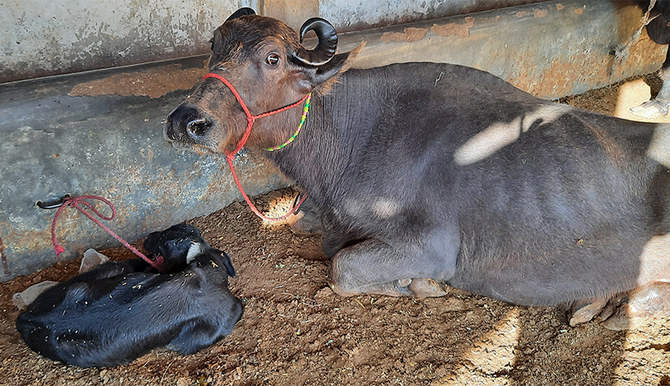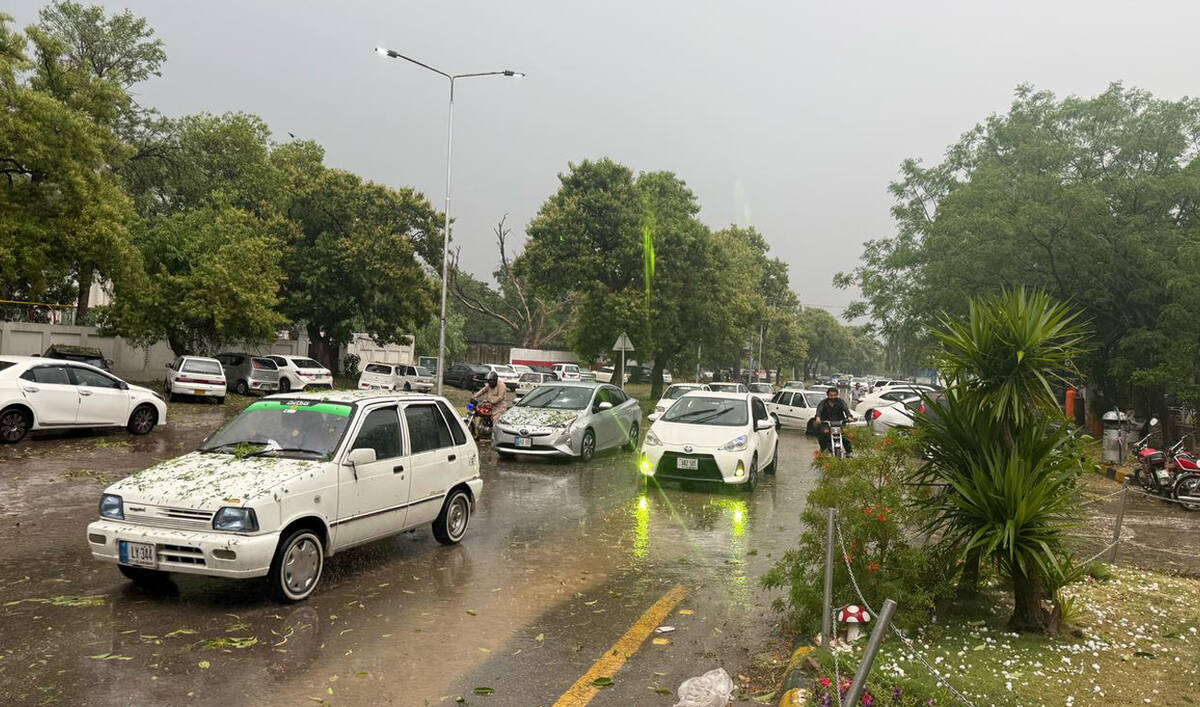KARACHI: More than 1.4 million animals are illegally killed every year in the cattle colonies of Karachi, officials and dairy farmers said, including newborn buffalo calves whose life span is no longer than a week as “commercial greed” lands them in slaughterhouses scattered across the port city.
Under the Karachi Municipal Corporation Slaughterhouse Byelaws 1975, it is forbidden to slaughter infant as well as “useful animals,” including those that are fertile.
There are currently around 700,000-800,000 milk producing animals in Karachi’s over a dozen cattle colonies, including 400,000 in just the famed Bhains Colony, the prime source of milk and meat for over 15 million residents of the capital of Sindh. These animals together produce around 4.5 million liters of milk daily.

Newborn calves with their mothers at the Bhains cattle colony in Karachi, Pakistan, on January 30, 2021. (AN Photo)
“Every year 700,000 calves, some of them a day-old, come with their mothers from Punjab [province] and interior of Sindh to the cattle colonies, including Bhains colony, and most of them are slaughtered within a week,” Shakir Umar Gujjar, president of the Dairy and Cattle Farmers Association (DCFA) told Arab News. “They are separated from their mother soon after birth.”
“The brutality does not end here,” he said. “After 272 days, the mothers, when they get dry [lactation ends], are sold at half price to butchers and new ones take their place. In this way, more than 1.4 million animals are eliminated every year. The practice has been going on for decades.”
Gujjar said one reason why dairy farmers sold newborn calves was the high cost of feeding them milk.

Buffalo calves at the Bhains cattle colony in Karachi, Pakistan, on January 30, 2021. (AN Photo)
“They sell the mothers’ milk instead of feeding it to the calf,” he said, saying farmers were financially burdened. “The animals eat more, but their average milk production is only around 8 liters.”
Farmers said they were incurring around Rs23 per liter of milk in losses due to the low price of milk, which in Karachi is Rs120/liter, while the cost of production was over Rs143 per liter.
Available for as low as Rs200 per infant, farmers insist they don’t sell the newborn babies for slaughter but so they can be reared — but a “mafia” was slaughtering them to be supplied to restaurants scattered across the city’s main highways.
“Every farmer wants to keep the calves, but the problem is that every calf needs 3-4 liters of milk every day which is not possible for financially troubled farmers,” dairy farmer Hammad Ala said. “It is not necessary that farmers sell calves for the purpose of slaughtering. Unfortunately, this is being done by a mafia which supplies meat to roadside restaurants.”
Dr. Mohsin Kiani, project manager for the federal government’s Save the Calf Project under the Livestock and Dairy Development Board, said the calf mortality rate in Pakistan was 30 percent but in Karachi, it was as high as 80 percent.

A newborn calf at the Bhains cattle colony in Karachi, Pakistan, on January 30, 2021. (AN Photo)
“Under the program, which would end in 2023, we have targeted saving 380,000 calves through various incentives to farmers, including a cash subsidy of Rs6,500 per animal,” Kiani told Arab News.
The program is ongoing in the Khyber-Pakhtunkhwa and Punjab provinces. Sindh was initially part of it, but later opted out to launch its own program, which could not materialize for financial reasons, Abdul Bari Pitafi, Sindh Minister for Livestock and Fisheries, said.
In the absence of incentives and a livestock management program at the government level, elite breeds of the water buffalo would keep ending up in Karachi’s slaughterhouses, experts warned.
“Karachi’s farmers buy the finest breeds of buffaloes from other parts of the country, but these end up in slaughterhouses. A buffalo, which can further be recycled for another 7-8 years, ends up in the food chain at the end of lactation period,” said Dr. Alamdar Hussain Malik, former secretary of the Pakistan Veterinary Medical Council.
“Milk production can only be enhanced by focusing on breeding as there is no other short cut for it,” he said. “Way out is to save the newborn calves and improve breeds by allocating space in the suburbs of the city for recycling.”






















